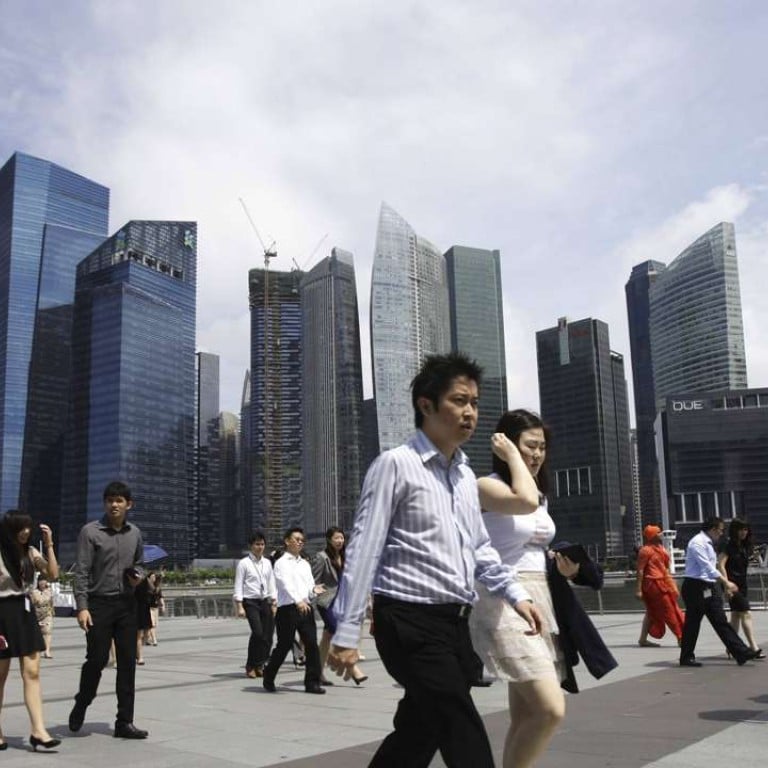
Why Hong Kong Sends Its Elderly to Guangdong
Why Hong Kong is sending its old people to Guangdong? It’s a question that unveils a complex tapestry woven from financial pressures, familial ties, and healthcare realities. This isn’t a simple story of abandonment; it’s a nuanced exploration of aging, affordability, and the evolving dynamics between Hong Kong and mainland China. We’ll delve into the economic factors pushing elderly residents across the border, examine the role of family support networks, and explore the often-overlooked cultural and linguistic challenges involved.
The high cost of living in Hong Kong, particularly the soaring expenses of healthcare and housing, plays a significant role. Many elderly residents find themselves facing difficult choices, weighing the familiar comforts of their homes against the increasingly unaffordable reality of staying. Meanwhile, Guangdong offers a compelling alternative: lower living costs, potentially better access to certain types of care, and the comforting presence of extended family.
But the transition isn’t without its challenges, from navigating a new healthcare system to overcoming language barriers and adapting to a different cultural landscape. This exploration will shed light on the motivations behind these moves, the difficulties faced by those who relocate, and the broader implications for both Hong Kong and Guangdong.
Cultural and Linguistic Factors

The migration of elderly Hong Kong residents to Guangdong presents a complex interplay of cultural similarities and differences, significantly impacting their adjustment and well-being. While Cantonese is spoken in both regions, subtle linguistic variations and differing cultural norms can create unexpected challenges for this vulnerable population. Understanding these factors is crucial for developing effective support programs and ensuring a smooth transition for these elderly migrants.
Cultural Similarities and Differences Affecting Elderly Migrants
Despite geographical proximity and shared linguistic roots, subtle yet significant cultural differences exist between Hong Kong and Guangdong. Hong Kong, having been under British colonial rule, exhibits a blend of Chinese and Western influences, reflected in its social norms, lifestyle, and even culinary preferences. Guangdong, on the other hand, retains a more traditional Chinese cultural landscape. These differences can manifest in various ways for elderly migrants.
For instance, the pace of life is generally faster in Hong Kong, while Guangdong often presents a more relaxed atmosphere. Differences in healthcare systems, social welfare programs, and even the style of interpersonal communication can lead to feelings of disorientation and isolation among new arrivals. Conversely, shared cultural values regarding family respect and filial piety often provide a strong foundation for integration, particularly within existing family networks in Guangdong.
Linguistic Challenges Faced by Elderly Hong Kong Residents in Guangdong
While both regions predominantly speak Cantonese, subtle dialectal variations exist. Elderly Hong Kong residents, accustomed to the Hong Kong Cantonese dialect, might find themselves struggling to fully understand the nuances of the Guangdong dialect. This is particularly true for individuals with hearing impairments or cognitive decline, further exacerbating communication difficulties. The use of specific vocabulary, colloquialisms, and even pronunciation differences can lead to misunderstandings in everyday interactions, affecting access to healthcare, social services, and even simple tasks like shopping or navigating public transport.
The inability to effectively communicate can lead to feelings of frustration, helplessness, and isolation.
Examples of Community Support Programs for Elderly Migrants in Guangdong, Why hong kong is sending its old people to guangdong
Recognizing the challenges faced by elderly Hong Kong migrants, several community-based organizations and government initiatives have emerged in Guangdong. These programs often provide language assistance through Cantonese-speaking volunteers or interpreters, facilitating access to essential services. Some organizations offer social activities and support groups specifically tailored to the needs of elderly Hong Kong residents, fostering a sense of community and reducing social isolation.
Furthermore, certain healthcare providers offer specialized services catering to the specific needs and cultural preferences of this population. These programs are often funded through a combination of government grants and private donations. One example might be a community center offering Cantonese language classes and social gatherings specifically for elderly Hong Kong residents, thereby facilitating integration and social connection.
Potential for Social Isolation Due to Language Barriers and Cultural Differences
The combined effect of linguistic and cultural differences can significantly increase the risk of social isolation among elderly Hong Kong migrants in Guangdong. Difficulty in communicating basic needs can lead to feelings of helplessness and dependence, hindering their ability to participate fully in their new environment. Cultural misunderstandings can further strain relationships with local residents, leading to feelings of exclusion and loneliness.
This social isolation can have detrimental effects on their mental and physical health, highlighting the need for comprehensive support programs to mitigate these risks. The lack of familiar social networks and the challenges in building new ones exacerbate the situation, particularly for those who have migrated without family support.
Resources and Support Systems Available to Elderly Cantonese Speakers in Guangdong
Government-funded social services
Many local government offices provide assistance to elderly residents, including those from Hong Kong, often with multilingual staff.
Community centers and senior centers
These facilities often organize activities and provide social support in Cantonese.
Healthcare providers with Cantonese-speaking staff
Hospitals and clinics in Guangdong are increasingly employing staff proficient in Cantonese to cater to the growing number of Hong Kong residents.
Volunteer organizations
Several non-profit organizations offer language assistance, social support, and practical help to elderly Cantonese speakers.
Cantonese-language media and communication platforms
Access to Cantonese news, radio, and television programs can help maintain connections with Hong Kong culture and reduce feelings of isolation.
Government Policies and Initiatives: Why Hong Kong Is Sending Its Old People To Guangdong

The movement of elderly Hong Kong residents to Guangdong is a complex issue shaped significantly by government policies on both sides of the border. Understanding these policies is crucial to grasping the motivations behind this migration. While neither government explicitly encourages the relocation of elderly individuals, several indirect incentives and initiatives play a significant role.
Hong Kong Government Policies Indirectly Encouraging Relocation
Several Hong Kong government policies, while not directly aimed at encouraging elderly relocation, may create conditions that make moving to Guangdong a more attractive option. For instance, the high cost of living in Hong Kong, particularly housing, pushes many elderly on fixed incomes to seek more affordable options in mainland China. Furthermore, the increasing demand for healthcare services in Hong Kong, coupled with potential wait times, might lead some to consider Guangdong’s healthcare system, particularly if they have family support there.
While Hong Kong’s public healthcare system is robust, the cost of private care can be prohibitive. The lack of sufficient subsidized elderly care facilities in Hong Kong also contributes to the appeal of potentially more affordable options in Guangdong.
Guangdong Government Initiatives Attracting Elderly Migrants from Hong Kong
Guangdong has implemented various initiatives aimed at attracting both Hong Kong and foreign investment, and some of these indirectly benefit elderly migrants from Hong Kong. These include improved infrastructure, including transportation links and communication networks, which facilitate easier movement and communication between Hong Kong and Guangdong. Furthermore, the development of more affordable housing options in Guangdong cities bordering Hong Kong, coupled with increasing investment in healthcare facilities, creates a more welcoming environment for elderly individuals seeking a lower cost of living and accessible healthcare.
Specific government programs directly targeting Hong Kong elderly migrants are less prominent, however, the overall improvement in quality of life in certain Guangdong cities acts as an indirect incentive.
Impact of Cross-Border Healthcare Arrangements on Relocation Decisions
Cross-border healthcare arrangements play a significant role in relocation decisions. While a comprehensive reciprocal healthcare system doesn’t exist, the availability of private healthcare services in Guangdong, often at a lower cost than in Hong Kong, influences some elderly individuals’ choices. The accessibility of certain treatments or specialists in Guangdong, coupled with family support networks, can be a compelling factor.
However, the lack of seamless integration between the two healthcare systems presents challenges, particularly in terms of insurance coverage and record transfer. This often means that elderly migrants need to carefully weigh the potential cost savings against the complexities of navigating two distinct healthcare systems.
Comparison of Immigration Policies Regarding Elderly Individuals
Both Hong Kong and Guangdong have immigration policies that indirectly affect the movement of elderly individuals. Hong Kong’s immigration policies are generally stricter, prioritizing skilled workers and family reunification. While there isn’t a specific policy preventing elderly individuals from moving to Guangdong, the process for obtaining long-term residency or permanent residency in Guangdong is less straightforward than in Hong Kong for elderly individuals who are not already eligible under family reunification schemes.
Guangdong’s policies focus more on attracting investment and skilled labor, with less emphasis on specific age-based immigration programs.
Summary of Policies and Their Impact
| Region | Policy/Initiative | Impact on Elderly Migration |
|---|---|---|
| Hong Kong | High cost of living (housing, healthcare) | Indirectly encourages relocation to Guangdong due to affordability |
| Hong Kong | Limited subsidized elderly care facilities | Increases the appeal of potentially more affordable options in Guangdong |
| Guangdong | Improved infrastructure (transportation, communication) | Facilitates easier movement and communication, making relocation more feasible |
| Guangdong | Development of more affordable housing | Attracts elderly individuals seeking lower cost of living |
| Both Regions | Cross-border healthcare arrangements (limited integration) | Influences decisions based on cost and accessibility of healthcare, despite complexities |
Ultimately, the story of Hong Kong’s elderly moving to Guangdong is a human story, one of adaptation, resilience, and the enduring power of family. While financial constraints and healthcare access are undeniably key drivers, the emotional and social considerations are equally important. It’s a testament to the complex interplay of economic realities, familial bonds, and cultural nuances shaping the lives of Hong Kong’s aging population.
Understanding this migration pattern requires looking beyond simple statistics and into the individual stories of those making this significant life change.
Hong Kong’s aging population is driving many elderly residents to Guangdong for more affordable care and a closer proximity to family. It’s a stark contrast to the vibrant world of fashion photography is in vogue , which highlights youth and dynamism. However, the underlying issue remains: the increasing need for practical solutions to Hong Kong’s demographic shift is impacting families in profound ways.
Hong Kong’s aging population and rising cost of living are pushing many elderly residents to Guangdong for more affordable care. It’s a fascinating demographic shift, reminding me of Alex Salmond’s political journey, as described in this insightful article: alex salmond went from the fringes to the mainstream and back again. Both situations highlight the complexities of navigating societal changes and resource allocation; the movement of Hong Kong’s elderly reflects a similar ebb and flow of influence, albeit on a personal rather than political scale.
Hong Kong’s elderly are increasingly moving to Guangdong for cheaper healthcare and assisted living, driven by rising costs and a strained social safety net. This demographic shift, however, isn’t just about economics; it highlights the complex relationship between Hong Kong and mainland China. One might even argue that disrupting this delicate balance could be a step towards figuring out how to provoke the fury of Xi Jinping, as detailed in this fascinating article: how to provoke the fury of xi jinping.
Ultimately, the movement of elderly Hong Kongers reflects broader political and social tensions affecting the region.

